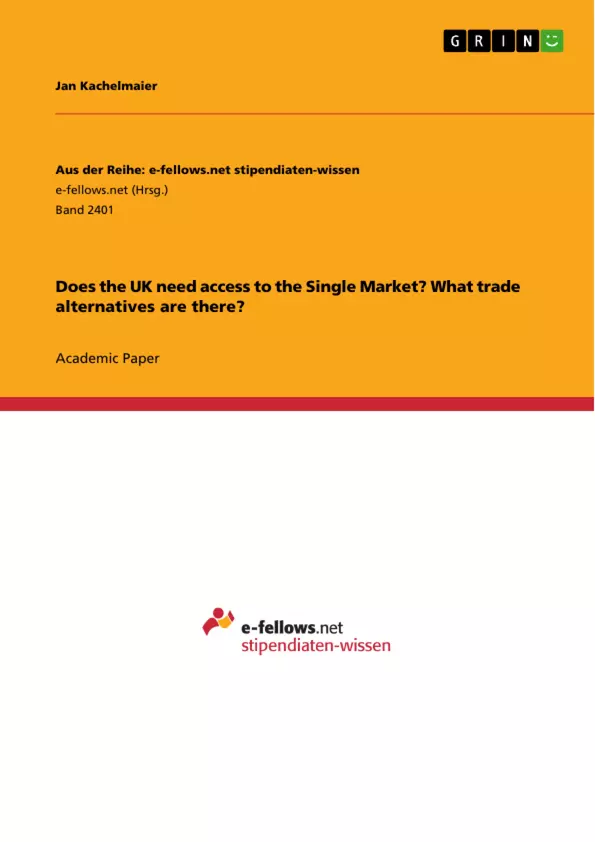In 1973 the United Kingdom joined the European Union and the Single Market. Through this partnership, both economies grew and benefited from each other. However, recently politicians have questioned the United Kingdom’s membership in the European Union and the Single Market, which led to political events such as the referendum for the Brexit. As the majority of the population decided to vote in favor of the Brexit, the necessity to analyze the dependency of the United Kingdom on the Single Market has increased.
This report provides an analysis of that dependency with respect to different groups of stakeholders, including companies in the industrial and service sectors as well as communities. The analysis is followed by an identification and evaluation of the most plausible trade alternatives. The findings of the report state that the United Kingdom highly depends on access to the Single Market on the short-term perspective, might be able to reduce it on the long-term perspective, but will unlikely become completely independent from the access to the Single Market.
Inhaltsverzeichnis (Table of Contents)
- Introduction
- The UK and the Single Market
- The dependency of the United Kingdom on the Single Market
- Possible Alternatives
- Three core models
- Soft Brexit
- Bilateral Trade Agreements
- Hard Brexit
- Three core models
- Conclusion
Zielsetzung und Themenschwerpunkte (Objectives and Key Themes)
This report analyzes the United Kingdom's dependency on the Single Market, examining its impact on various stakeholders including companies, industries, and communities. It then explores potential trade alternatives and evaluates their plausibility, ultimately concluding that the UK remains highly dependent on the Single Market in the short term, with potential for long-term reduction but unlikely complete independence.
- The UK's economic dependency on the Single Market
- The implications of Brexit for various stakeholders
- The evaluation of potential trade alternatives
- The short-term and long-term prospects of the UK's economic independence
- The challenges and opportunities of negotiating trade terms with the EU
Zusammenfassung der Kapitel (Chapter Summaries)
The introduction chapter provides an overview of the UK's membership in the European Union and the Single Market, highlighting the growth of trade between the two entities. It also explores the advantages and disadvantages of the UK's membership, including the benefits of free movement of goods, persons, services, and capital, while acknowledging concerns regarding the EU budget and bureaucracy.
The chapter "The UK and the Single Market" delves into the dependency of the UK on the Single Market, providing empirical data on the significant proportion of UK trade with the EU. This chapter also examines the role of services and the free movement of people in the UK's trade with the EU.
The chapter "Possible Alternatives" explores different trade models that could potentially replace the UK's current relationship with the Single Market. It focuses on three core models: Soft Brexit, Bilateral Trade Agreements, and Hard Brexit, outlining the key characteristics and potential implications of each model.
Schlüsselwörter (Keywords)
The report focuses on the UK's dependency on the Single Market, analyzing its impact on companies, industries, and communities. It explores potential trade alternatives following Brexit, including Soft Brexit, Bilateral Trade Agreements, and Hard Brexit. The report highlights the importance of the Single Market for the UK's economy and the challenges of negotiating trade terms with the EU.
Frequently Asked Questions
How dependent is the UK economy on the EU Single Market?
The UK is highly dependent on the Single Market, as a significant proportion of its trade in both goods and services is conducted with EU member states.
What are the main trade alternatives to the Single Market for the UK?
The three core models discussed are a "Soft Brexit" (staying close to the Single Market), Bilateral Trade Agreements, and a "Hard Brexit" (trading under WTO rules).
What does "Soft Brexit" entail?
A Soft Brexit typically involves remaining part of the European Economic Area (EEA) or a similar arrangement, maintaining high levels of access to the Single Market while accepting some EU regulations.
Can the UK become completely independent of the Single Market?
While the UK might reduce its dependency in the long term, the report suggests it is unlikely to become completely independent due to geographic proximity and established supply chains.
How does Brexit affect the service sector?
The service sector, which is a major part of the UK economy, relies heavily on the free movement of people and specific regulatory alignments provided by the Single Market.
- Citation du texte
- Jan Kachelmaier (Auteur), 2016, Does the UK need access to the Single Market? What trade alternatives are there?, Munich, GRIN Verlag, https://www.grin.com/document/369746



